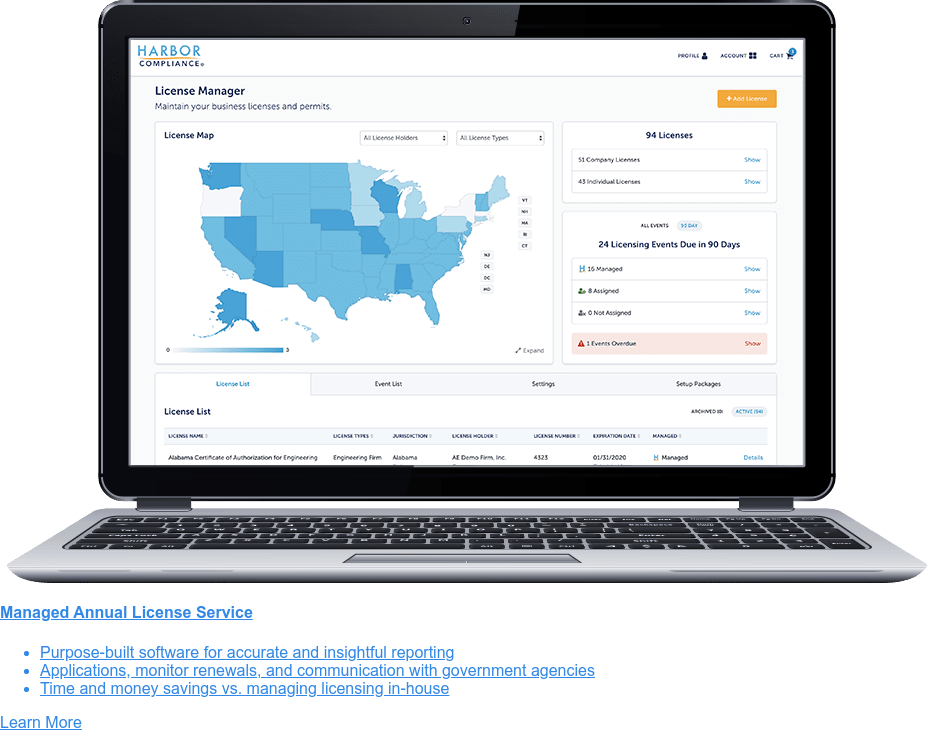
Landscape Architect Licensing
Landscape architecture is a regulated profession in every state, and a license is required prior to practicing or soliciting business as a landscape architect.
Explore Licensing in your State:
Prerequisites
State boards for landscape architecture each have their own requirements for licensure, but potential licensees will follow a similar path of prerequisites to obtain a license in any state. Prerequisites typically include:
- An education requirement - Many states require a degree from an LAAB (Landscape Architectural Accreditation Board) or LAAC (Landscape Architecture Accreditation Council) accredited program.
- Successful completion of the Landscape Architect Registration Examination (LARE), testing an applicant's knowledge and competency of landscape architecture skills.
- A requisite amount of landscape architecture experience, which is typically between 2 and 4 years and is usually completed under the supervision of a professional landscape architect.
Advanced Degree Waiver: In some cases, the state board may waive the requirement of an accredited degree and register an applicant who has demonstrated professional experience that is deemed to be equivalent to a degree in landscape architecture from an accredited program
Additional Requirements
In addition to the standard licensing requirements mentioned above, some states have additional requirements that go beyond what is required in other states. Additional requirements often include:
- Duration of state residency
- A reference from licensed landscape architect
- Additional experience
- Additional jurisdiction-specific exam (beyond the LARE)
Initial Application Process
After meeting the prerequisites for licensure, applicants can begin the license application process. Depending on the state, applicants may need to file an application with the board prior to taking the LARE, after passing the LARE, or both prior to taking and after passing the LARE.
Like the application process, application fees also vary by state. Some states charge separate fees for exam applications, license applications, and the issuance of the license, while other states charge a single flat fee. In many states, applicants must wait until their license application is approved before submitting the license fee and then receiving their license from the board.
Reciprocal Registration
Thanks to reciprocity, many landscape architects are licensed to practice in more than just one jurisdiction for greater job flexibility, mobility, and security. Reciprocity or licensure by comity is when a registered landscape architect in one jurisdiction applies for registration in another by providing documentation that he or she meets that jurisdiction's registration requirements. Typically this is accomplished through a CLARB Council Record.
A council record stores an individual’s history of education, experience, examination, licensure, and professional references and helps state boards verify key information about reciprocal applicants. Many registration boards require a CLARB Council Record as a part of reciprocal registration, although some will consider applicants without this record.
Renewal Requirements
Landscape architect licenses typically need to be renewed on an annual or biennial basis. In addition to filing a renewal application and paying the license renewal fee, the majority of states also require landscape architects to complete continuing education hours during the license renewal period. Many states require either 24 or 30 hours of continuing education over the course of a two-year license period. Keeping up with each state’s requirements, tracking renewals, and submitting the applications on time is critical to avoiding penalties. Dedicated compliance software and services can help you keep track of varying jurisdiction requirements and relevant updates to state laws.
ARE (Architect Registration Examination) - Assesses candidates for their knowledge, skills, and ability to provide the various services required to be a practicing architect.
AXP (Architectural Experience Program) - NCARB program for architectural internship, a requirement for licensure that occurs after filling the educational requirements.
BEFA (Broadly Experienced Foreign Architect) - An alternative NCARB certification that allows foreign architects to independently practice architecture.
COA (Certificate of Authorization) - The most common name of the registration required for firms to practice architecture in a given state.
Design Firm - Architectural firm registration is sometimes grouped with engineering and land surveying on a single “design firm” application form.
NCARB Certification - Licensed architects have the option to become Certificate holders to signify that they have met national standards established by U.S. licensing boards for protecting public health, safety, and welfare. Certification also facilitates reciprocal registration in all 54 jurisdictions, 11 Canadian jurisdictions, and can be used to support an application for licensure in other countries.
Reciprocity - This is when a licensed architect in one state can provide documentation (often a NCARB certificate) to more easily apply for licensure in another jurisdiction.
State Board - Often referred to as the State Architects Licensure Board or Board of Architects, an individual state’s board serves as the regulatory authority for architects. The board qualifies and licenses individuals seeking architectural licensure. The board is responsible for preserving the public health, safety, and welfare of individuals who occupy built environments.
National Architecture Accrediting Board
NAAB establishes criteria for and accredits professional architecture degree programs in the United States.
The American Institute of
Architecture Students (AIAS)
AIAS is an independent, student-run group that promotes excellence in architecture education, training, and practice.
The American Institute of Architects (AIA)
AIA is a voluntary professional organization for architects providing advocacy, information, and community.
The Association of Collegiate
Schools of Architecture (ACSA)
ACSA represents architectural education programs across the globe.
The National Council of Architectural Registration Boards (NCARB)
NCARB is the national organization representing the state registration boards.




